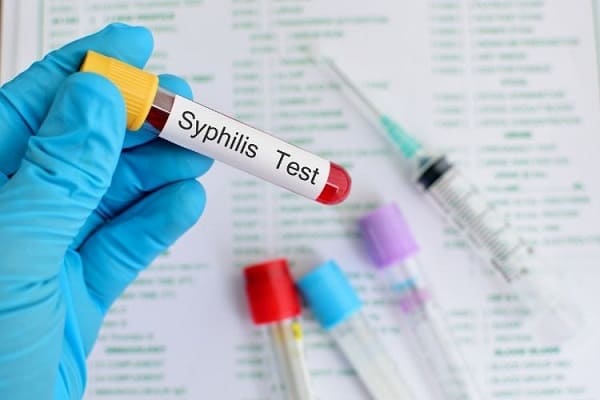What are regulations on the serum test for syphilis in Vietnam?
Regarding laboratory diagnosis, what are regulations on the serum test for syphilis in Vietnam?

What are regulations on the serum test for syphilis in Vietnam? - image from internet
Based on Subsection 2.3.1, Section II of the Guidelines for the Diagnosis and Treatment of Syphilis (Issued with Decision 5186/QD-BYT in 2021), the regulations for rapid diagnostic tests for syphilis are as follows:
Indirect Method: Serum Test for Syphilis
- There are two types of serum tests commonly used for the laboratory diagnosis of syphilis: non-specific tests and specific tests.
- The main specimen used is serum. Some non-specific tests can also use serum as the specimen. Additionally, cerebrospinal fluid specimens are used for the diagnosis of congenital syphilis, neurosyphilis, and when there are neurological symptoms.
Non-specific tests
- The most common and widely used non-specific tests are RPR (rapid plasma reagin card test) and VDRL (venereal disease research laboratory).
- These tests detect non-specific IgM or IgG antibodies against lipid. These antibodies can also be detected in other diseases such as viral fever, some autoimmune diseases, leading to false-positive results and non-specificity for syphilis.
- False-negative results can occur within the first 4 weeks after the appearance of primary lesions and during the late stage of syphilis.
- In primary and secondary syphilis, non-specific tests can yield false-negative results due to the phenomenon of prozone reaction (caused by a very high concentration of antibodies in the specimen, inhibiting the formation of antigen-antibody complexes). Patients with suspected primary syphilis lesions should be retested after 2-4 weeks to confirm the diagnosis. A negative non-specific test at 3 months after the appearance of chancre lesions can exclude syphilis.
- False-positive cases often have low titers of antibodies (< 1/4).
- Qualitative non-specific tests are used in combination with specific tests for the diagnosis of syphilis.
- Quantitative non-specific tests are used to monitor treatment effectiveness based on changes in antibody titers. If the treatment is effective, the antibody titer will decrease. If the disease does not respond well to treatment, the antibody titer will increase.
- A significant change in antibody titers (increase/decrease) ≥ 4 times, equivalent to a ≥ 2-fold dilution of serum between two consecutive tests, is considered a significant change (using the same method, either RPR or VDRL, and the same laboratory) (e.g., from 1/16 to 1/4 in a patient who responds to treatment, or from 1/8 to 1/32 in a case with poor treatment response).
- If the antibody titer changes ≤ 2 times, equivalent to a 1-fold dilution (e.g., 1/8 and 1/4, 1/2 and 1/1), it is considered not significant.
Specific tests
- Specific tests include TPHA (treponema pallidum hemagglutination assay), TPPA (treponema pallidum particle agglutination assay), and FTA abs (fluorescent treponema antibody absorption test).
- These tests detect specific antibodies against treponema pallidum antigens, thus having high specificity. However, these tests cannot differentiate between antigens in syphilis and those caused by other spirochete bacteria (e.g., yaws).
- Even after successful treatment, specific tests may remain positive for a lifetime (85% of cases), therefore they cannot differentiate between active disease and past treatment and are not used for post-treatment monitoring.
- Specific tests are indicated after obtaining a positive result with non-specific tests to confirm the diagnosis or vice versa.
Best regards!










